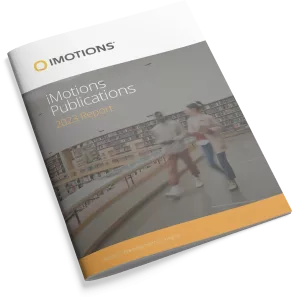-
The vampire effect of smartphone swiping: how atypical motor actions increase ad attention but impair brand recall
Consumers’ swiping behavior largely determines their exposure to social media advertisements. According to embodied cognition and enactment theory, advertisers might leverage atypical swiping to increase attention and thus brand recall. To identify typical smartphone swiping, the authors develop a taxonomy of the motor actions consumers exhibit when browsing social media in real life. A mobile […]
-
Architectural design, visual attention, and human cognition: exploring responses to federal building styles
This article examines the ongoing architectural debate surrounding styles for American government buildings. It tests the results of the 2020 National Civic Art Society survey that found 72% of Americans prefer traditional federal buildings over modern designs. To gain a neuro-biological perspective on these results, eye-tracking emulation software is used to evaluate the relationship between […]
-
EEG, Pupil Dilations, and Other Physiological Measures of Working Memory Load in the Sternberg Task
Recent evidence shows that physiological cues, such as pupil dilation (PD), heart rate (HR), skin conductivity (SC), and electroencephalography (EEG), can indicate cognitive load (CL) in users while performing tasks. This paper aims to investigate physiological (multimodal) measurement of CL in a Sternberg memory task as the difficulty level increases in both maintenance and probe […]
-
Developing 360-degree stimuli for virtual tourism research: a five-step mixed measures procedure
Virtual reality has emerged as a powerful tool for the design of immersive tourism experiences. Prior studies have primarily relied on externally produced 360-degree stimuli, with the potential to undermine causal inference among concepts and increase risk of flattening real-world responses. Consequently, building on design principles embedded in human–computer interaction, this paper draws on an […]
-
Towards a typology of virtual tourists: Efficacy of visual patterns and attentional cues
Virtual tourism is rapidly emerging in prominence in contemporary tourism research. Previous studies tend to consider the virtual tourism population as a homogeneous entity, resulting in unintended consequences. Despite the ocular-centric nature within virtual environments, existing eye tracking studies have rarely classified virtual tourists into benefit-based segments, discounting the critical role of pre-existing visual patterns and associated […]
-
Young Customer Responses to Service Robots vs. Humans in Luxury Retail: A Multidisciplinary Approach
Luxury retailers are increasingly considering the introduction of service robots in their stores to enhance the value proposition and reshape the dynamics of both the service encounter and the customer experience. Although the literature recognizes the social presence of robots in service encounters, little empirical research compares humans and service robots related to luxury. In […]
-
Unveiling impact dynamics: Discriminatory brand advertisements, stress response, and the call for ethical marketing practices
This research explores the impact of discriminatory brand advertisements on groups experiencing discrimination, employing the transactional theory of stress and coping. The findings reveal that discriminatory-offensive advertisements induce stress, quantified via galvanic skin response, predominantly in highly discriminated groups. This stress subsequently catalyzes motivational approach tendencies over time, as evidenced by electroencephalogram measurements. The study […]
-
Perspectives of Young Digital Natives on Digital Marketing: Exploring Annoyance and Effectiveness with Eye-Tracking Analysis
Currently, there are a wide range of approaches to deploying digital ads, with advanced technologies now being harnessed to craft advertising that is engaging and even tailored to personal interests and preferences, yet potentially distracting and irritating. This research seeks to evaluate contemporary digital advertising methods by assessing how annoying they are to users, particularly […]
-
Dyadic Interactions and Interpersonal Perception: An Exploration of Behavioral Cues for Technology-Assisted Mediation
Mediators aim to shape group dynamics in various ways, such as improving trust and cohesion, balancing participation, and promoting constructive conflict resolution. Technological systems used to mediate human-human interactions must be able to continuously assess the state of the interaction and generate appropriate actions. In this paper, behavioral cues that indicate interpersonal perception in dyadic […]
-
Investigating the impact of greenery elements in office environments on cognitive performance, visual attention and distraction: An eye-tracking pilot-study in virtual realityUnveiling impact dynamics: Discriminatory brand advertisements, stress response, and the call for ethical marketing practices
The human-nature connection is one of the main aspects determining supportive and comfortable office environments. In this context, the application of eye-tracking-equipped Virtual Reality (VR) devices to support an evaluation on the effect of greenery elements indoors on individuals’ efficiency and engagement is limited. A new approach to investigate visual attention, distraction, cognitive load and […]
Research Report 2024
In-depth look at the scientific landscape as powered by iMotions software, showcasing groundbreaking research and the impact of our tools in various scientific and industrial fields.
iMotions Science Resources
Looking for white papers, validation reports or research show casing iMotions Multimodal capabilities?
Share Your Research

850+ universities worldwide with an iMotions human behavior lab
73 of the top 100 highest ranked universities
710+ published research papers using iMotions
iMotions is used for some of the most interesting human behavior research studies carried out by top researchers around the world. Contact us to have your publication featured here.
The authors of these publications have used iMotions as a software tool within their research.
“Software should be cited on the same basis as any other research product such as a paper or a book; that is, authors should cite the appropriate set of software products just as they cite the appropriate set of papers” (Katz et al., 2020).
We therefore encourage you to cite the use of iMotions where appropriate.
How to cite iMotions
APA
iMotions (10), iMotions A/S, Copenhagen, Denmark, (2024).
Note: adjust the version and year where relevant.
5 Most Popular Blogs
Learn How to Conduct Human Behavior Research with iMotions
Publications
Read publications made possible with iMotions
Blog
Get inspired and learn more from our expert content writers
Newsletter
A monthly close up of latest product and research news




